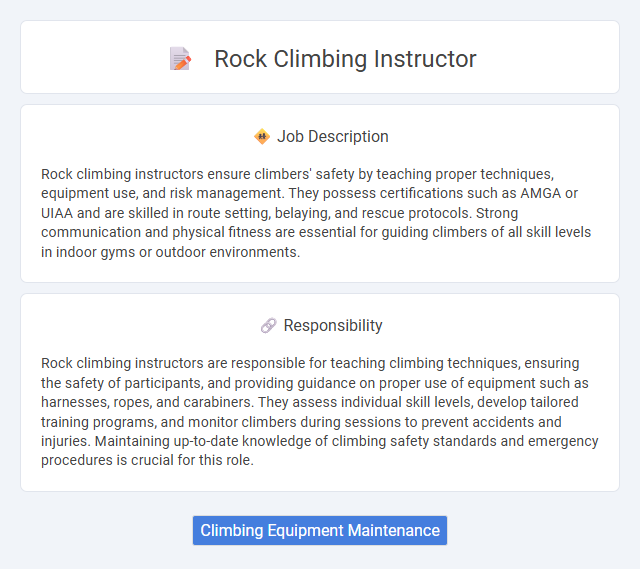
Rock climbing instructors ensure climbers' safety by teaching proper techniques, equipment use, and risk management. They possess certifications such as AMGA or UIAA and are skilled in route setting, belaying, and rescue protocols. Strong communication and physical fitness are essential for guiding climbers of all skill levels in indoor gyms or outdoor environments.
Individuals with strong physical fitness, excellent coordination, and a passion for outdoor activities are likely suitable for a rock climbing instructor role. People prone to anxiety or with certain medical conditions, such as severe joint problems or vertigo, may find it less suitable due to the physical and mental demands of the job. Those who enjoy teaching, have good communication skills, and remain calm under pressure probably thrive in this position.
Qualification
A Rock Climbing Instructor must possess certification from recognized organizations such as the American Mountain Guides Association (AMGA) or the International Federation of Sport Climbing (IFSC). Strong skills in belaying, lead climbing, and route setting along with first aid and CPR certification are essential for safety management. Experience in risk assessment, outdoor instruction, and effective communication enhances the ability to teach climbing techniques to diverse skill levels.
Responsibility
Rock climbing instructors are responsible for teaching climbing techniques, ensuring the safety of participants, and providing guidance on proper use of equipment such as harnesses, ropes, and carabiners. They assess individual skill levels, develop tailored training programs, and monitor climbers during sessions to prevent accidents and injuries. Maintaining up-to-date knowledge of climbing safety standards and emergency procedures is crucial for this role.
Benefit
Rock climbing instructor jobs likely offer physical fitness benefits by promoting strength and endurance through regular climbing activities. These roles probably provide opportunities for developing leadership and communication skills while guiding climbers safely. There is also a strong chance of enjoying a rewarding work environment that fosters outdoor adventure and personal growth.
Challenge
Rock climbing instructor roles likely involve guiding clients through physically and mentally demanding routes, presenting a consistent challenge that tests both technical skills and problem-solving abilities. The job probably requires adaptability to varying skill levels and environmental conditions, making it a dynamic and stimulating career choice. Opportunities to push personal limits while ensuring climbers' safety could be common aspects of this profession.
Career Advancement
Rock climbing instructors gain valuable skills in safety protocol, route setting, and client communication, which create pathways for career advancement into roles such as guide, outdoor educator, or climbing gym manager. Certification through recognized organizations like the American Mountain Guides Association (AMGA) significantly enhances job prospects and opens opportunities for higher-level instructional positions. Continuous professional development in advanced climbing techniques and rescue operations positions instructors for leadership roles within adventure tourism companies.
Key Terms
Climbing Equipment Maintenance
A rock climbing instructor must ensure all climbing equipment, including harnesses, ropes, carabiners, and helmets, is regularly inspected and maintained to meet strict safety standards. Proper equipment maintenance reduces the risk of accidents and ensures durability and reliability during climbs. Knowledge of industry regulations, such as those from the UIAA and OSHA, is essential for maintaining optimal gear performance and climber safety.
 kuljobs.com
kuljobs.com